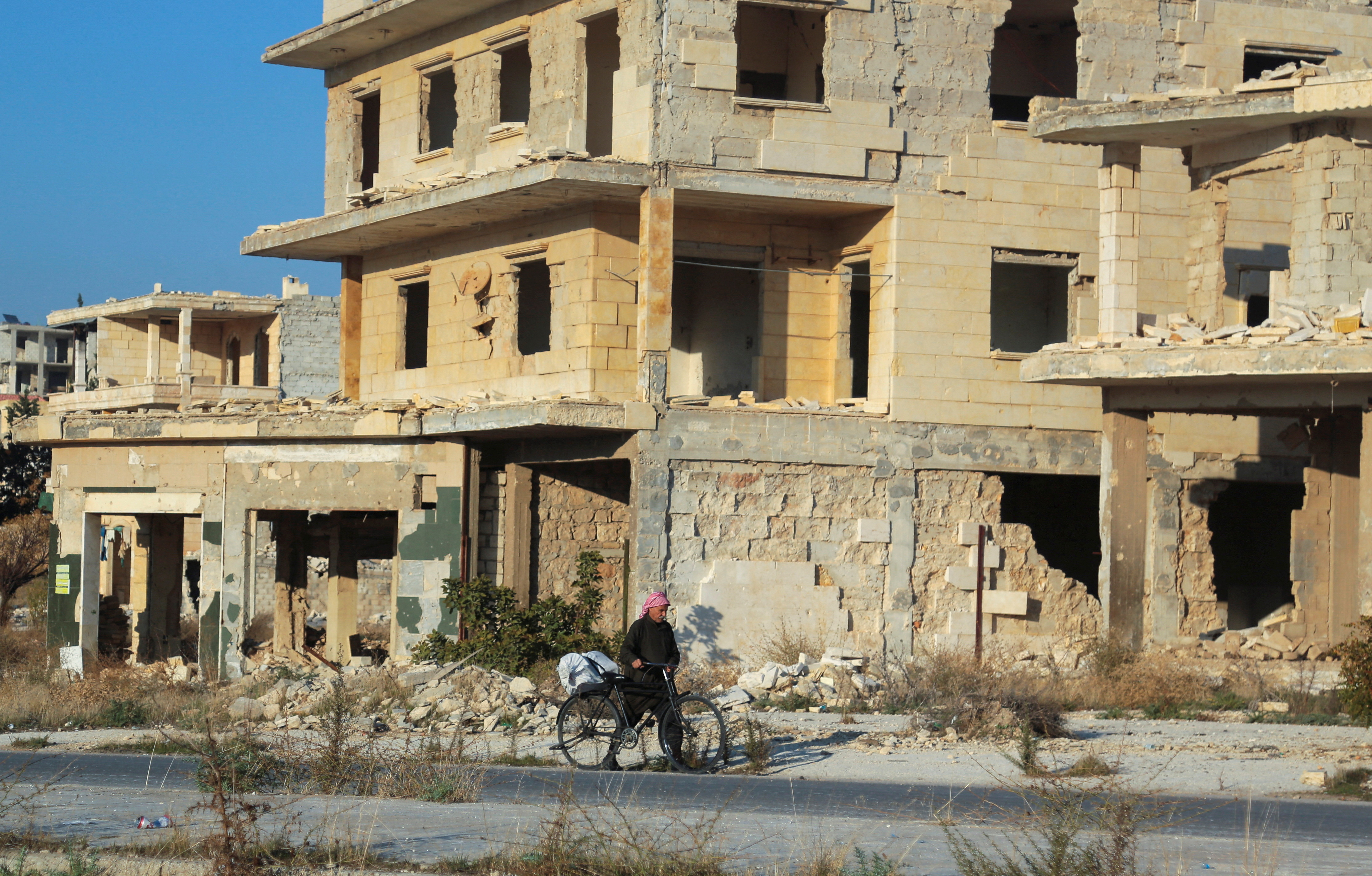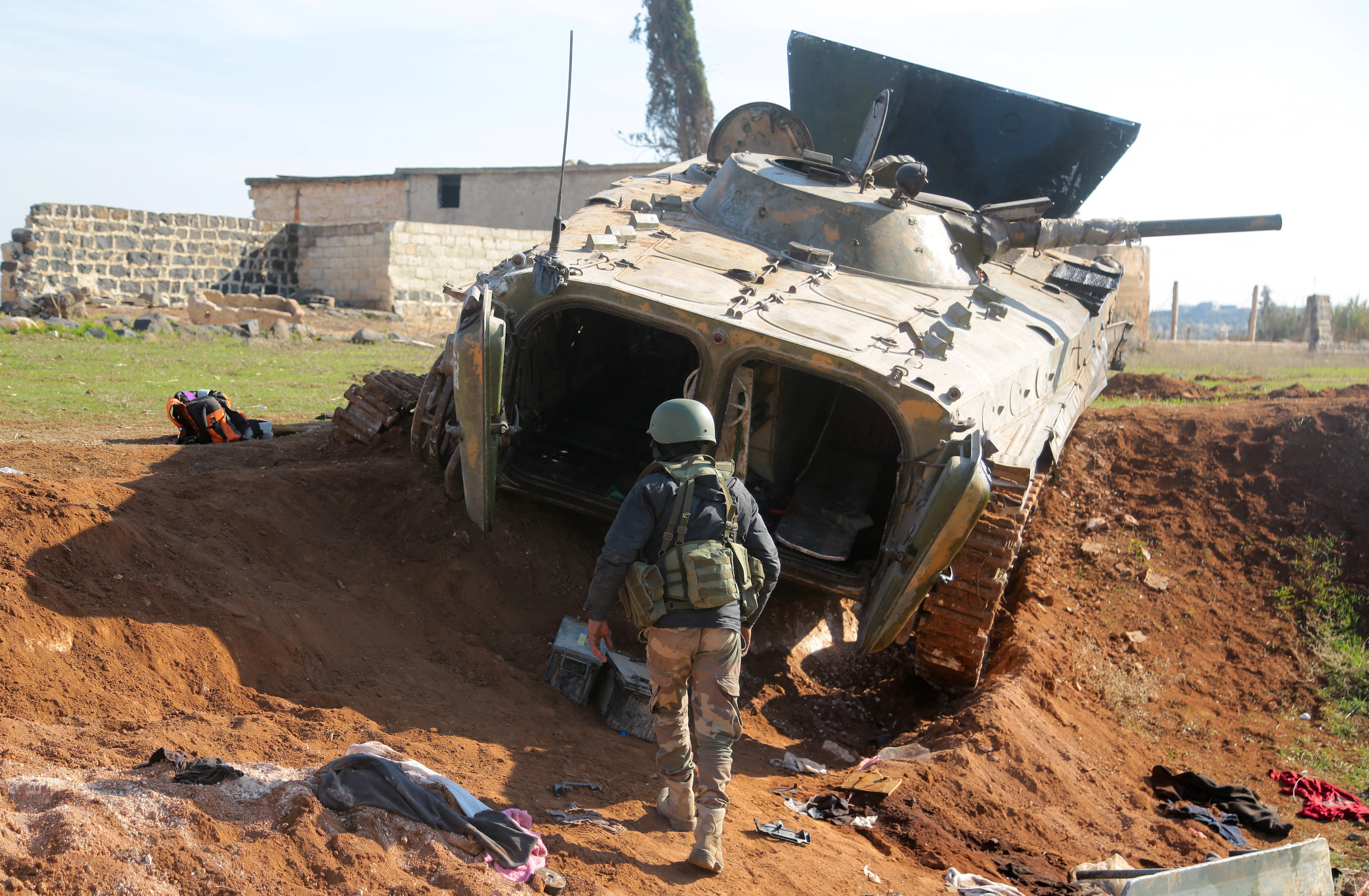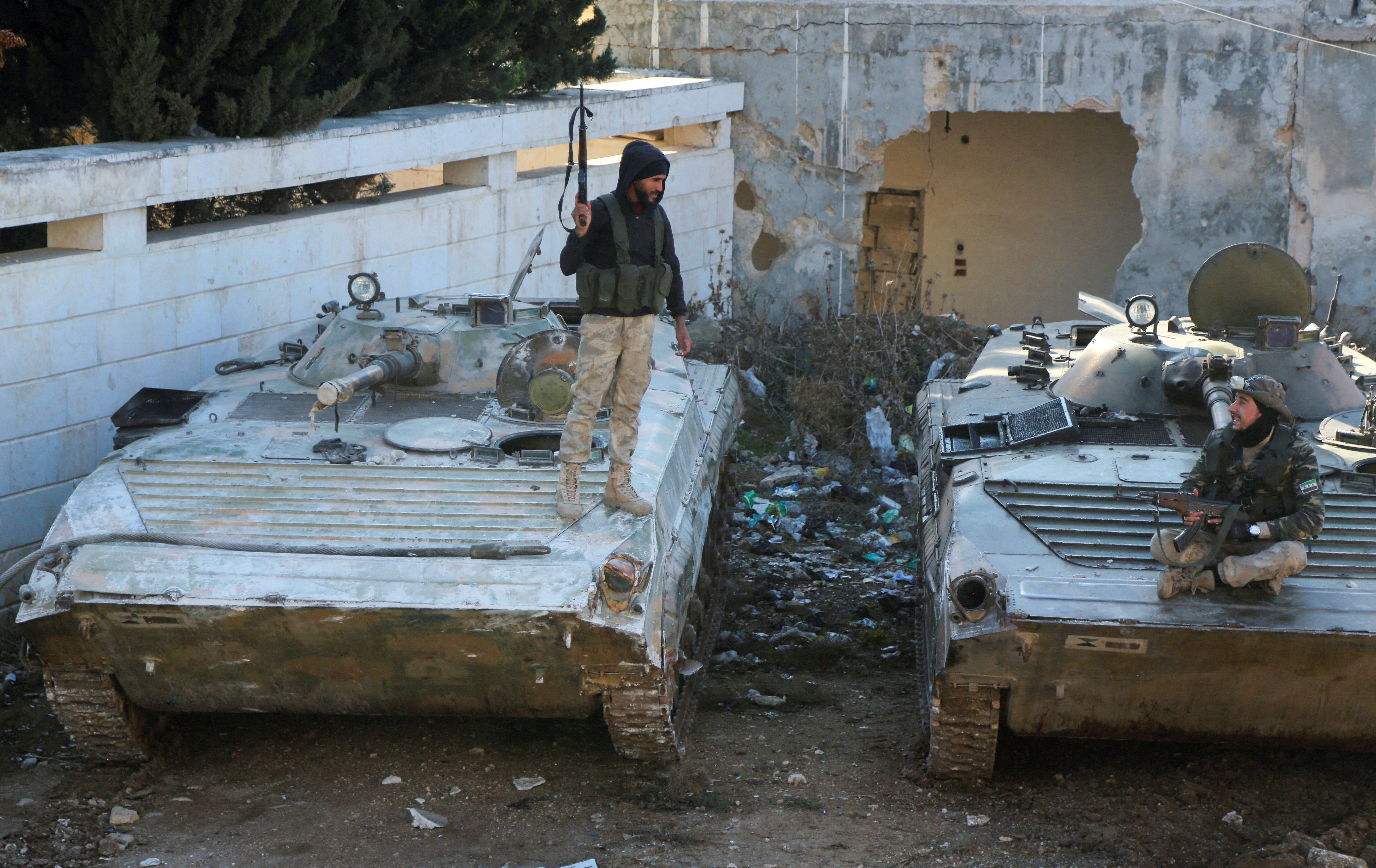A rebel fighter holds his weapon as he stands in front of a military vehicle in Menagh, north of Aleppo, Syria December 2, 2024. REUTERS

A man walks with his bike past damaged buildings in Tel Rifaat, Syria December 2, 2024. REUTERS

A rebel fighter walks near a military vehicle in Menagh, north of Aleppo, Syria December 2, 2024. REUTERS

Rebel fighters talk together as one of them stands on a military vehicle holding a weapon in the town of Tel Rifaat, Syria December 2, 2024. REUTERS
Summary
- Iran-backed militias cross into Syria, sources say
- No Hezbollah plan to join fight now, sources say
- Iran says it will provide ‘any support needed’
- Rebels seized Aleppo last week in lightning assault
- Syrian and Russian airstrikes target rebel-held areas
AMMAN/BEIRUT, (Reuters) – Hundreds of Iran-backed Iraqi fighters crossed into Syria on Monday to help the government fight rebels who seized Aleppo last week, but Lebanon’s Hezbollah has no plans for now to join them, according to sources.
Iran’s constellation of allied regional militia groups, aided by Russian air power, has been integral to the success of pro-government forces in subduing rebels in Syria who rose up against President Bashar al-Assad in 2011.
But that alliance faces a new test after last week’s lightning advance by rebels in northwest Syria, with Russia focused on war in Ukraine and Hezbollah’s leadership decimated by a war with Israel that ended in a ceasefire last week.
The rebel storm of Aleppo is the biggest success of anti-Assad fighters for years. Government forces had held complete control of Aleppo since capturing what was then Syria’s largest city in a siege in 2016, one of the major turning points of a war that has killed hundreds of thousands of people.
The head of Syria’s main opposition group abroad, Hadi al-Bahra, told Reuters the rebels were able to seize the city so quickly because Hezbollah and other Iran-backed groups were distracted by their conflict with Israel.
Preparations had been made since last year for an assault on Aleppo, but the war in Gaza held it up, he said.
Syria’s civil war had been frozen since 2020, with Assad in control of most territory and all major cities. Rebels still held an enclave in the northwest, Turkey-backed forces held a strip along the northern border and U.S.-backed, Kurdish-led forces controlled a pocket in the northeast.
Any prolonged escalation in Syria risks further destabilising a region roiled by the conflicts in
Gaza and Lebanon, with millions of Syrians already displaced and with regional and global powers backing rival forces in the country.
Iraqi and Syrian sources confirmed the deployment of more Iran-backed Iraqi fighters to Syria. Iran’s Foreign Minister said Tehran “will provide any support needed” and that “resistance groups” would come to Assad’s aid.
At least 300 fighters, primarily from Iraq’s Badr and Nujabaa groups, crossed late on Sunday using a dirt road to avoid the official border crossing, two Iraqi security sources said, adding that they were there to defend a Shi’ite shrine.
A senior Syrian military source said the fighters had crossed in small groups to avoid airstrikes. “These are fresh reinforcements being sent to aid our comrades on the front lines in the north,” the source said.
The head of Iraq’s Popular Mobilisation Forces, which includes the major Shi’ite militia groups aligned with Iran, said no group under its umbrella had entered Syria, and that it does not operate outside Iraq.
The spokesperson of the Iran-aligned Iraqi armed group Kataib Hezbollah, meanwhile, said in a statement on Monday that the group was closely monitoring “the aggression of criminal groups on the Syrian people”, adding that they had not yet decided whether to send fighters.
Lebanon’s Hezbollah, long the most capable Iran-backed force on the battlefield and key to Assad’s military alliance in Syria, has not yet been asked to intervene and was not ready to send forces after its gruelling conflict with Israel, said three sources familiar with the group’s thinking.
One of the sources said the group had pulled senior officers responsible for Aleppo out of northern Syria to help in the ground war against Israel that raged until last week’s ceasefire. Two other sources, one Lebanese and the other Syrian, said Hezbollah had pulled back forces from Syria in mid-October when the fighting with Israel intensified.
Arab countries and Washington have seen the weakening of Hezbollah as a potential opportunity to peel Assad away from his alliance with Iran.
Sources have told Reuters that the United Arab Emirates and United States had been discussing the possibility of lifting sanctions against Assad if he reduces his reliance on Tehran. The rebel advance could complicate this, if it pushes Assad to depend more on Iranian support.
DEADLY STRIKES
Russia, whose 2015 entry into the conflict turned the military balance decisively in Assad’s favour, continues to support him and is analysing the situation on the ground, the Kremlin said.
On Sunday Moscow dismissed the general in charge of its forces in Syria, Russian war bloggers reported.
The Syrian government said Syrian and Russian air forces were striking rebel-held positions in the countryside east of Aleppo city.
The White Helmets rescue organisation and residents of rebel-held areas in the north said warplanes had hit residential areas of Aleppo city and a displaced people’s camp in Idlib province where seven people were killed, including five children.
The government said the military was working to secure a string of towns recaptured from rebels on Sunday that run along the front line north of Hama, a major city lying between Aleppo and Damascus. Rebel shelling of Hama killed three people on Monday, state television said.
The Syrian government said it had killed hundreds of rebel fighters in recent days, which Reuters could not independently confirm.
The rebels fighting in Aleppo, Idlib and Hama provinces in northwest Syria include mainstream groups backed by Turkey as well as the Islamist Hayat Tahrir al-Sham, the former al-Qaeda affiliate in Syria.
A Turkish official told Reuters Turkey had not given any permission for the rebel offensive, and Hayat Tahrir al-Sham took no instructions from Turkey.
The Turkish and Iranian foreign ministers discussed the fighting in Syria on Monday. Turkish Foreign Minister Hakan Fidan said rebel advances could not be explained by foreign intervention and urged the Syrian opposition to compromise.
A spokesperson for Israel’s military said it would not let Iran exploit the Syria conflict to transfer weapons to Hezbollah.
Turkey’s state-owned Anadolu news agency said the Turkey-backed Syrian National Army had taken the town of Tel Rifaat from the Kurdish YPG militia and was advancing in outer areas of the district.
Rebel sources and an Aleppo resident said the Kurdish YPG group was pulling out of longstanding positions in the city’s Sheikh Maqsoud district under a deal with rebel forces.
Reporting by Suleiman al-Khalidi in Amman, Maya al-Gebeily and Laila Bassam in Beirut, Jonathan Spicer in Istanbul, Nayera Abdallah in Dubai, Menna Alaa El Din and Jaidaa Taha in Cairo Writing by Angus McDowall Editing by Timothy Heritage, Peter Graff and Rosalba O’Brien







